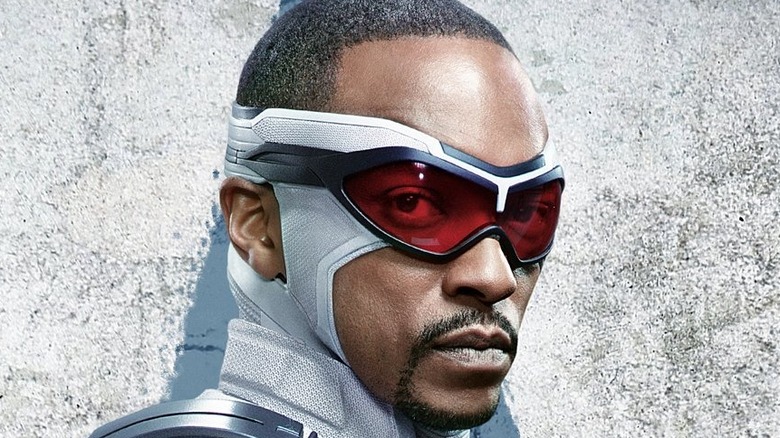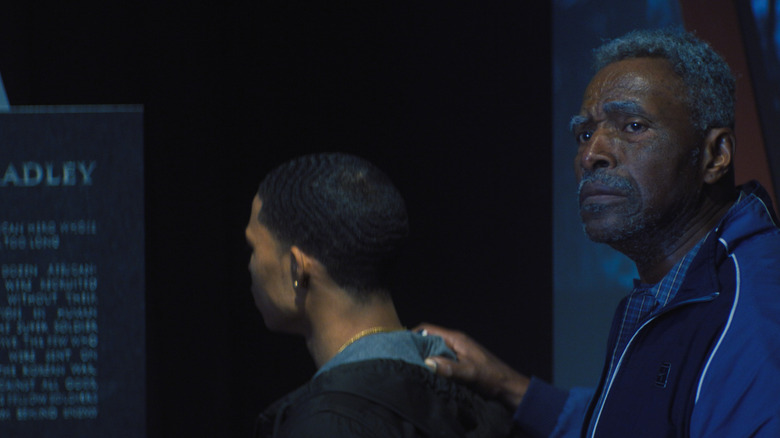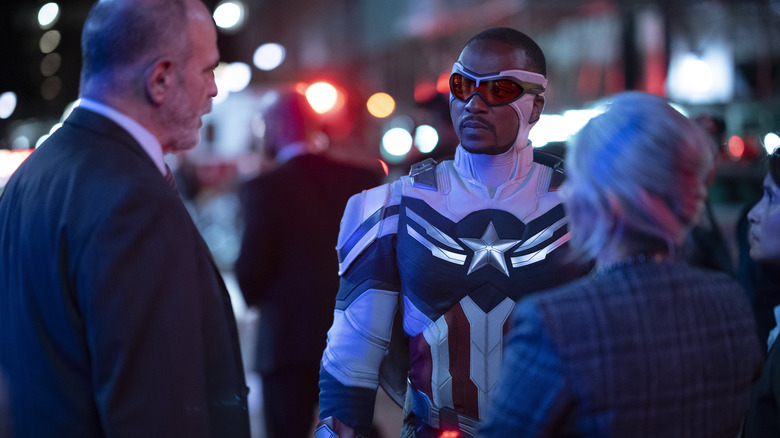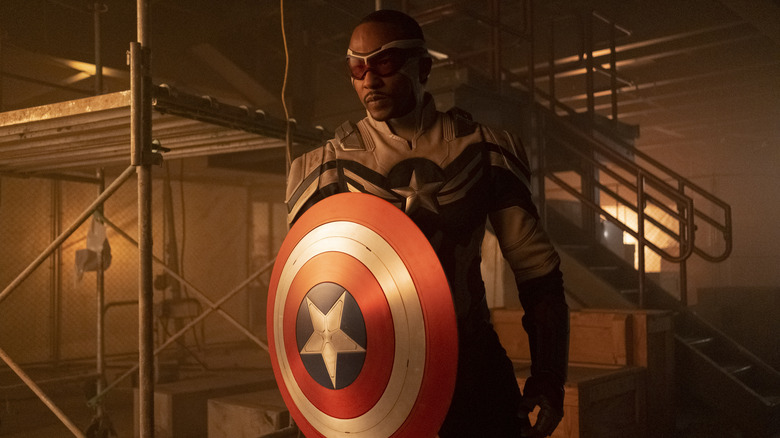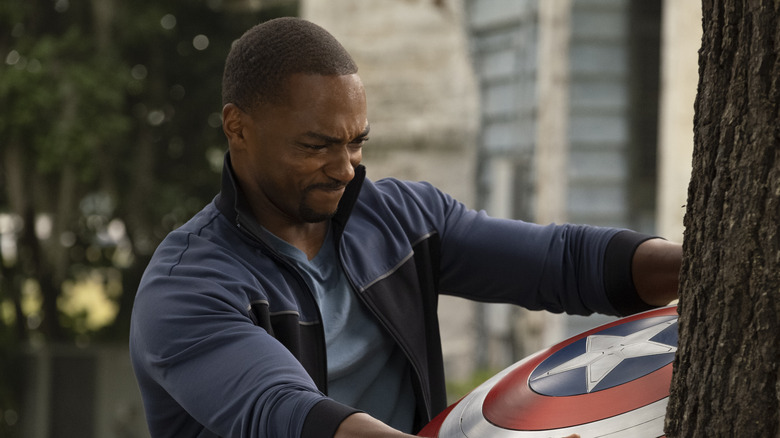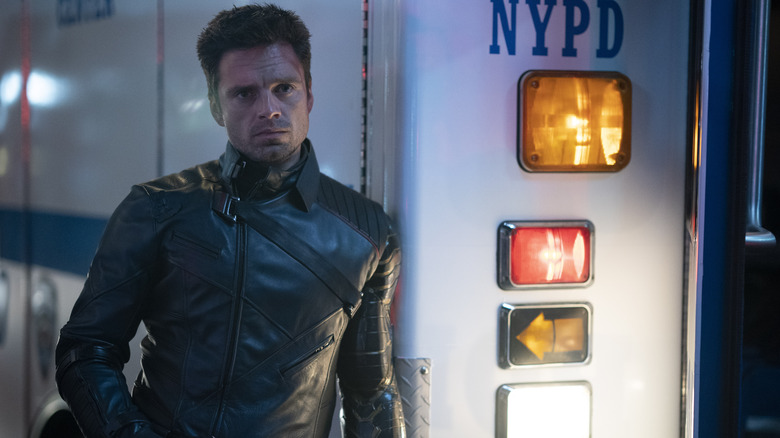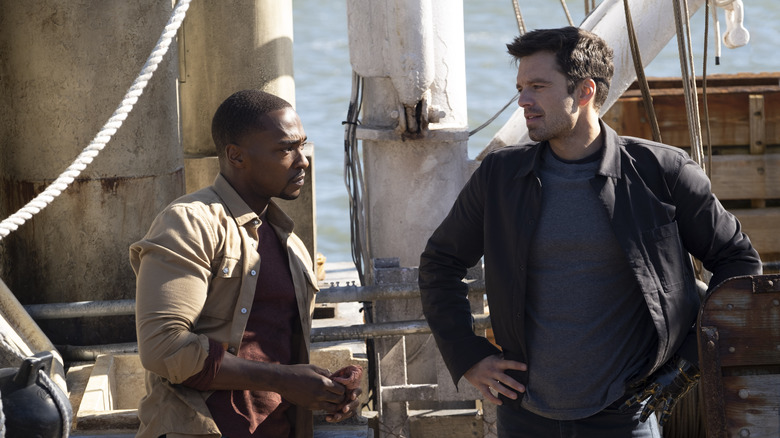The Falcon And Winter Soldier Composer Henry Jackman Reveals What It's Really Like To Write For Two Caps - Exclusive Interview
If the "Falcon and the Winter Soldier" soundtrack sounds familiar to MCU fans, that's probably because longtime "Captain America" composer Henry Jackman was front and center on the project's music. Jackman entered the MCU with the second "Captain America" film, "Captain America: The Winter Soldier," and he's contributed music to every Cap project since. But that's not all Jackman has on his resume: He's been writing some of your favorite movie and TV scores since the early 2000s.
Between hard-hitting films like "Kick-Ass," "The 5th Wave," and "Cherry," Jackman has contributed to a slew of animated projects like "Bee Movie," "Winnie the Pooh," "Big Hero 6," and "Ralph Breaks the Internet." Even before he started penning music for Cap, Jackman worked on fandom faves with franchises like "Pirates of the Caribbean," "The Simpsons," "X-Men," "Jumanji," and "Pokémon."
During an exclusive interview, Looper spoke with Henry Jackman about switching gears from Steve Rogers' Cap to Sam Wilson's — and how he went about composing some of the hard-hitting sequences of "The Falcon and the Winter Soldier." Jackman also dished on whether or not he would be game to continue his work with future "Captain America" projects.
The many musical shades of Cap
You've composed every Captain America project since "Winter Soldier." What was the biggest difference composing for a Steve Rogers project, as opposed to a Sam Wilson Captain America series? And what were the most significant ways you honored each character musically — especially with scenes like the New Orleans bits of "The Falcon and the Winter Soldier?"
That's a really pertinent question. I mean, you hit the nail on the head. When you think of the history of Steve Rogers coming from "The First Avenger," his ultimate origin is the upstanding ... What is it, the original phrase? "The sentinel of liberty," and it comes from a very politically confident part of America's political history — where the Nazis are the bad guys, and America has this sort of ... it even has a word, like American exceptionalism.
It's uncomplicated. He's a hero, bad guys are vanquished, and there's no need to question anything. By the time you get to our show, "Falcon and the Winter Soldier," it's so much more complicated and highlighted in what you're talking about. In the scenes with Isaiah Bradley, not only does Sam Wilson feel a burden to pick up the shield, just from the legacy of how much respect he had for Steve Rogers, by the time you find out the horrific things that were going on with Isaiah Bradley, who says to him, "They'll never let a Black man pick up that shield."
Captain America for the modern ages
And even more troubling for Sam is when Isaiah says, "And even if they did, no self-respecting Black man should even pick up the shield." That is a hugely different legacy to become ... It's much more complicated for Sam than it was for Steve Rogers. So I think my most important musical mission was ... I don't know if you know that there's a track called "Louisiana Hero" ... and some of the instrumentation of that leaks over into those Louisiana scenes, the scenes of the boat, getting the bank loan, and the more grounded scenes of Sam's background and some of the challenges that he's got. They're having a real nightmare with the boat. Unbelievably, they can't seem to get what would seem like a pretty straightforward loan.
I would probably give him an interest-free one, given that he helped save the world, but that's not what's happening. So it was important for me to take ... I actually took a motif from "Winter Soldier" that was like his Falcon motif, and then brought it into the show and expanded it to realize Sam's full potential to be the kind of wiser ... I'm not saying Steve Rogers wasn't wise. He was a great Captain America, but Sam has had to arrive at the place that he arrives at the end of episode six with a lot more thought and a lot more burden about what that shield represents.
Not least that there's a competition for the shield with John Walker, so it's complicated for loads of reasons. But you get to see Louisiana, you get to meet his sister, you know his background, and I wanted to reflect that musically. So that's what that piece is all about. "Louisiana Hero" is 50% sort of the aspirational orchestral, uplifting, patriotic theme that you would expect. But then it also has this undercurrent of guitar and Hammond and this other more grounded, non-classical musical approach that I felt was really important to inform Sam, and therefore, it informs his background in the Louisiana scenes. So that would be a good example of what you're talking about.
Taking action
"The Falcon and the Winter Soldier" is one of the most powerful MCU projects to date, tackling myriad critical issues, from racism to trauma. How did that aspect of this project impact composition, and what were the major feelings you were trying to insert into the music during those specific scenes?
Well, that's another really good question because it's a tricky balance, because what's genius about Marvel shows is ... well, particularly this one, is how do you ... It's partly the writing, Malcom Spellman's writing's amazing. Because you want to address ... What's groundbreaking about this show is you do get these issues. You get the issues as I've just described with Isaiah Bradley and what happened, and sure enough, being African-American, he was treated completely differently — and they tried to delete him.
So these issues are really important, but you don't want the show to become some sort of political polemic. They're like socially conscious movies. It's still a Marvel show that has the Easter eggs and the reveals and all the twists and the turns and the action and the spectacle and all of the ... It's a very entertaining show. So in a way, it's more difficult. If you're writing a movie or engaged in a show that's specifically about women's rights or the rights of ethnic minorities or something, it's such a specific thing. You can double down on it being a very serious, high-minded type of project.
I would actually argue it's more difficult to write something that has integrity as a show and then musically represents that where it combines without using a sledgehammer. Because don't forget, the thing about it being a Marvel show is millions of people ... Maybe only hundreds of thousands would see some indie movie about some very worthy subject matter.
The musical balance
What's genius about Marvel is heaven knows that millions of people ... Think how many kids are watching this and not having specific intellectual thoughts. They're just seeing a version of a new Captain America with a slightly different approach. It's just like an example, but it has to be still an entertaining show. It can't become like some sort of a school lesson on politics or anything.
And so it's the same with the music. Again, just going back to "Louisiana Hero," you still want the mojo and the feeling of the uplift and the heroism, but then, in those Isaiah Bradley scenes, for example, the music had to be very respectful of performances of that nature. When you have a scene that's so well-acted and has really important material that's not just important within the show, but the subject being discussed is socially relevant now, you have to tread ... If you listen carefully to the key there, you don't want to be too musically invasive, whereas when he's talking and leaping into action and sort of saving people, that's when you want to use a patriotic theme and full orchestration to give you that Marvel feeling that we know and love.
Thy symphony of superheroes
But then, this show also has more grounded and troubling issues, like racial issues, and Bucky is trying to deal with the fact that he was sort of occupied neurologically and killed loads of people, and he even knows people whose sons he's murdered. So it's a combination of ... What was really progressive in the show was how grounded some of the scenes were, so the backstories you get of Bucky being deprogrammed, Bucky trying to make amends, and Sam's journey to try and figure out if it's even a good idea to pick up the shield.
All of that gets reflected musically. And so it's challenging because it's nuanced. It's not a show where you have some arch-villain and an uncomplicated hero, and they just sort of smash into each other. And a lot of that nuance is in the original writing, but it flows over into the music-making demands that the music is also nuanced and can contribute to some of these more sensitive subject matters.
Cap's musical future
Were you a fan of Marvel before getting your first MCU gig, and would you be game to work on "Captain America 4" or season 2 of "The Falcon and the Winter Soldier" — or any other MCU projects?
My experience at Marvel is that the powers that be know an awful lot more about what is or isn't happening. And it was such a privilege to be called back on this one, and I didn't know it was happening. So if you think back to those early days, like phase one, you couldn't possibly have predicted where it's gotten to. And I guess there's only a handful of people who know where it's going. So your best bet when you're invited into the process is just to do the best job ... because it's a serious task.
This "Falcon and the Winter Soldier" show, if you add up the amount of music, it's like twice the amount of music that was in "Avengers: Endgame." And there's a lot going on, and there's certainly enough to occupy you. It was a major undertaking to bring in these themes from the past, like the Zemo theme, some of the "Winter Soldier" callbacks when he's triggered and almost goes back to being the assassin, and some of the "Civil War" themes — and you had the new material required for the Flag Smashers.
The more civilian theme is used for Bucky when he's not Winter Soldier — how to take the original Falcon motif and turn it into a whole superhero thing. Trust me, there is enough to occupy you without speculating on where it's going to ... If you spend too much time speculating about what's happening in the future, you'll drop the ball.
All 6 episodes of "The Falcon and the Winter Soldier" are available to binge on Disney+.
